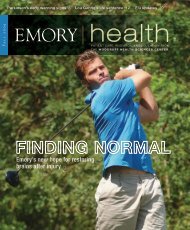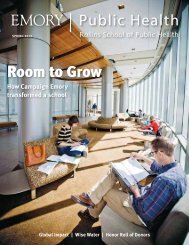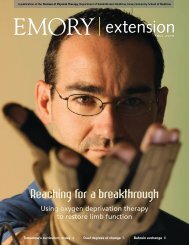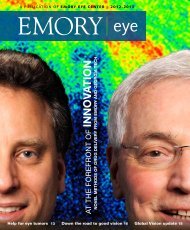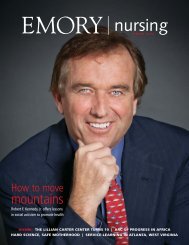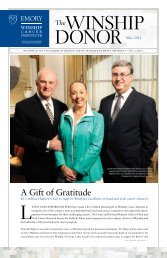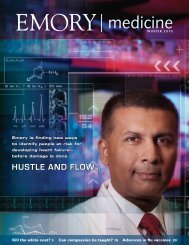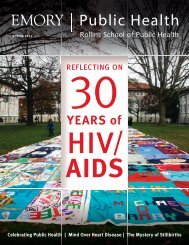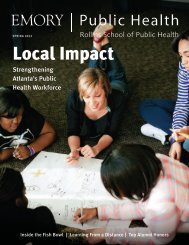returning quality to life - Woodruff Health Sciences Center - Emory ...
returning quality to life - Woodruff Health Sciences Center - Emory ...
returning quality to life - Woodruff Health Sciences Center - Emory ...
You also want an ePaper? Increase the reach of your titles
YUMPU automatically turns print PDFs into web optimized ePapers that Google loves.
million study with the NIH and NCI. So far,<br />
<strong>to</strong>tal funding from GCC <strong>to</strong> Winship has<br />
<strong>to</strong>taled $66.3 million.<br />
Although Todd focuses on the coalition’s<br />
strategic goals, every day he makes a<br />
connection with an individual case—be it<br />
a relative, a business associate, or friend<br />
like Jordan, who fought six cancers for two<br />
GCC distinguished scholar Ruth<br />
O’Regan directs Winship’s breast<br />
cancer translational research program.<br />
decades. After he died, Jordan’s publisher<br />
donated copies of his book, No such thing as<br />
a bad day, <strong>to</strong> the coalition.<br />
“We provide free books <strong>to</strong> cancer<br />
survivors throughout the state,” says Todd.<br />
“It’s gratifying <strong>to</strong> know that our founder’s<br />
words continue <strong>to</strong> inspire newly diagnosed<br />
patients. Hamil<strong>to</strong>n would be happy <strong>to</strong> know<br />
that the lessons he learned are still helping<br />
others cope through their cancer journey.”<br />
—Robin Tricoles<br />
WEB CONNECTION To learn more about the<br />
Georgia Cancer Coalition’s collaborations<br />
with <strong>Emory</strong>, visit georgiacancer.org.<br />
Cancer Survivorship All Grown Up<br />
An adult patient walks in<strong>to</strong> a doc<strong>to</strong>r’s<br />
office and tells a physician about<br />
beating cancer as a kid some 10, 20,<br />
even 30 years before. “OK, what does that<br />
mean <strong>to</strong> me?” the doc<strong>to</strong>r says, unaware of<br />
new research showing that pediatric cancer<br />
survivors are often at a greater risk for breast<br />
cancer, weakening of heart muscle, or a<br />
second, new primary cancer. The patient,<br />
also unaware, doesn’t know enough <strong>to</strong> ask for<br />
the right preventive tests.<br />
This scenario haunts<br />
<strong>Emory</strong> epidemiologist<br />
Ann Mertens and is<br />
the motivating fac<strong>to</strong>r<br />
behind her new project,<br />
SurvivorLink. An online<br />
database for pediatric<br />
cancer survivors<br />
and their families, SurvivorLink allows<br />
users <strong>to</strong> s<strong>to</strong>re medical information, learn<br />
about recommended screenings as they<br />
age, and share this and the latest evidencebased<br />
findings with their medical doc<strong>to</strong>rs.<br />
The project—funded by a three-year grant<br />
of more than $1 million from the federal<br />
Agency for <strong>Health</strong>care and Research<br />
Quality—is unlike any other existing<br />
database, according <strong>to</strong> Mertens. “Doc<strong>to</strong>rs<br />
can actually look at this and say, ‘OK this was<br />
the diagnosis, this is the treatment they had,<br />
and this is the recommended screening as we<br />
move forward.’ In essence, we’re putting an<br />
infrastructure in place so we can educate the<br />
primary care physician as well.”<br />
SurvivorLink promises <strong>to</strong> bridge the<br />
gap of information that exists between<br />
researchers and practitioners, patients and<br />
physicians. It can even be a much-needed<br />
resource for an adult who may have a hazy<br />
memory of a childhood radiation treatment.<br />
“For example, a 15-year-old might not<br />
necessarily be interested in possible infertility<br />
because of their cancer treatment,” Mertens<br />
says, “but when you’re 22 or 24, or maybe<br />
thinking about being married, all of a sudden<br />
that becomes important.<br />
The SurvivorLink pilot began in<br />
September with recruitment of 500 pediatric<br />
cancer survivors in Georgia under the age<br />
of 21. Over the next six months, Mertens<br />
will track their use of SurvivorLink <strong>to</strong> see if<br />
they are learning more about their cancer<br />
treatment and long-term health as well as <strong>to</strong><br />
solicit feedback from their doc<strong>to</strong>rs.<br />
At the end of the pilot phase, Mertens<br />
will use patient and physician input <strong>to</strong><br />
enhance the website before making<br />
SurvivorLink available <strong>to</strong> all of<br />
Georgia’s pediatric cancer survivors—<br />
no matter how old. After all, there’s<br />
another scenario Mertens would<br />
like <strong>to</strong> make a reality.<br />
“When the patient and<br />
parent come in the door<br />
and the parent says, ‘My son needs an<br />
echocardiogram,’ the physician can say ‘Oh,<br />
you’re right. You know what, I just looked<br />
on this website, and it explains <strong>to</strong> me why<br />
he needs it, how often he needs it, and the<br />
treatment he had that would cause me <strong>to</strong> look<br />
for this.’”<br />
This way, Mertens says, cancer survivors<br />
can bridge their past <strong>to</strong> a future that doesn’t<br />
just extend <strong>life</strong> longer but is happier and<br />
healthier. —Dana Goldman<br />
WEB CONNECTION To hear an interview<br />
with Ann Mertens about Survivor Link,<br />
visit http://bit.ly/survivorlink.<br />
Winter 2011 19



